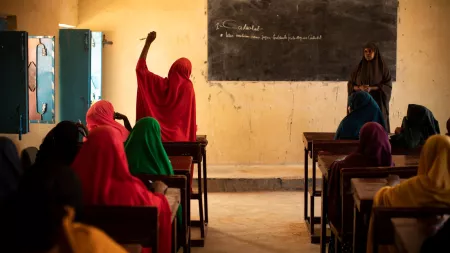As the world commemorates International Day of Zero Tolerance for Female Genital Mutilation (FGM) on the 6th of February, CARE is concerned by the continued practice which is negatively affecting girls in Somalia/Somaliland and calls for a zero-tolerance policy towards the harmful practice.
According to UNICEF data Somalia has the highest rate of FGM in the world with around 98% of women aged 15 to 49 having undergone it.
FGM results in complications that range from bleeding and infection to problems with urination and complications with childbearing and this has contributed to Somalia having one of the highest maternal mortality rates in the world[1].
Delaying the age of the first pregnancy, stopping harmful practices such as female genital mutilation, and ensuring timely access to obstetric care have been identified as remedies that can be done to reduce the high maternal mortality rates in the country.
IMAN ABDULLAHI- CARE SOMALIA/SOMALILAND COUNTRY DIRECTOR SAYS:
“Our teams continue to report horrific cases of girls undergoing FGM and in some cases losing their lives. The effects of FGM are far-reaching and stay with the girls until they grow up. We should be putting our focus on investing in the girl child, they need education and access to sexual reproductive information so that they can make decisions for themselves.
The COVID-19 pandemic has made the situation worse as there have been reports of door-to-door FMG occurring during the period schools closed and all the girls were at home.
CARE SOMALIA/SOMALILAND has been working with communities and we are happy to see some mothers and girls now beginning to speak against the practice, we have established school clubs and we now have girl champions who are raising awareness within their communities on the detrimental effects of FGM.
We call upon the relevant authorities to adopt a zero-tolerance approach on all forms of FGM.
AMINA* FROM ERIGAVO A MEMBER OF WOMEN GROUPS ESTABLISHED BY CARE TO RAISE AWARENESS ON FGM SAYS
“I was highly motivated by the chance to break the ice on FGM and start community dialogue on a topic that was kept taboo for many years in our community. I am happy that FGM, which was a “women’s issue” and was neglected by men for so long, now concerns both men and women who finally talk about this issue openly even on national television!”
’FGM has destroyed so many young girls’ lives. Everyone needs to face the truth that FGM does not make a woman more marriageable, faithful, clean; FGM only brings a lifetime of challenges for both wife and husband, physically and psychologically’’
/ENDS
Notes to editors
- Founded in 1945, CARE is a leading humanitarian organization fighting global poverty. CARE has more than seven decades of experience helping people prepare for disasters, providing lifesaving assistance when a crisis hits, and helping communities recover after the emergency has passed. CARE places special focus on women and children, who are often disproportionately affected by disasters. To learn more, visit www.care-international.org.
- CARE is working with young girls through school clubs and women groups to raise awareness of the harmful effects of COVID-19. CARE is also working with national and district-level FGM task forces consisting of influential and respected community leaders (women and men) who have received training and technical support to address these issues in the targeted districts. Task Forces were trained on community-level FGM messaging and awareness-raising.
- Female genital mutilation (FGM) refers to all procedures involving partial or total removal of the female external genitalia or other injury to the female genital organs for non-medical reasons.
*Name changed
